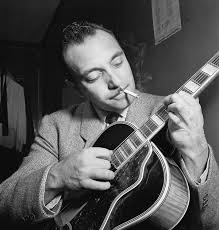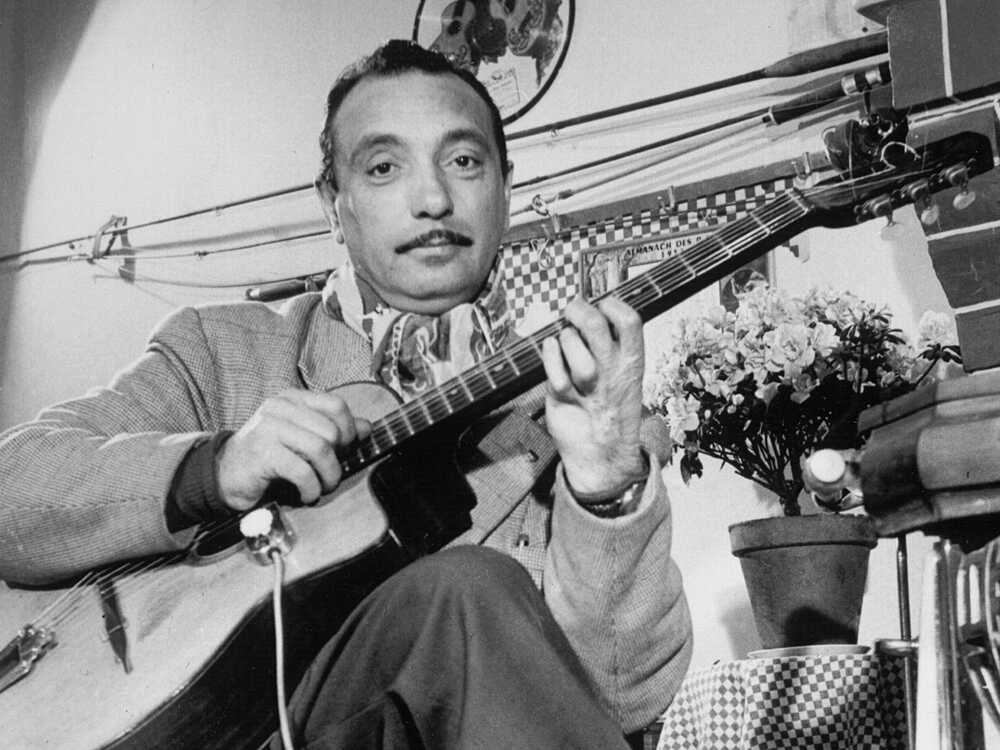Django Reinhardt’s life reads like a jazz composition: rich, dynamic, and full of improvisation. Born on January 23, 1910, in Liberchies, Belgium, he would go on to become one of the most influential guitarists in the history of jazz.
Raised in a Romani (Gypsy) community near Paris, Reinhardt was introduced to music at a young age. His father played music in a traveling circus, and Django quickly picked up the banjo and later the guitar. Despite never receiving formal training, his natural talent and relentless practice led him to master the instrument.
- The Birth of a Legend: Django Reinhardt was born on January 23, 1910, in Liberchies, Belgium. His birth name was Jean Reinhardt, but he later adopted the nickname “Django,” which is said to have Romani origins, reflecting his heritage.
- A Remarkable Comeback: At the age of 18, Django Reinhardt was involved in a caravan fire accident that badly burned his left hand and damaged two fingers. Despite being told he would never play guitar again, Django defied the odds and developed a unique technique that allowed him to play with only two fingers and a partially paralyzed third finger on his left hand.
- The Birth of Gypsy Jazz: Reinhardt, along with violinist Stéphane Grappelli, founded the Quintette du Hot Club de France in 1934. This quintet, which featured three guitars, violin, and double bass, pioneered a new style of jazz known as “Gypsy Jazz” or “Jazz Manouche,” characterized by its fast tempos, virtuosic improvisation, and intricate guitar solos.
- A Guitar Virtuoso: Django Reinhardt’s innovative guitar playing revolutionized jazz music. Despite his limited finger mobility, he developed a distinctive style characterized by lightning-fast runs, cascading arpeggios, and expressive bends. His improvisational skills were unparalleled, earning him admiration from fellow musicians and audiences alike.
- Global Influence: Django Reinhardt’s influence transcended borders and generations. His music spread across Europe and beyond, inspiring countless musicians, from jazz legends like Charlie Parker and Duke Ellington to contemporary artists such as Bireli Lagrene and Jimmy Rosenberg. His legacy continues to shape the world of jazz and guitar playing today.
- International Performer: Reinhardt toured extensively throughout his career, performing in prestigious venues across Europe and the United States. His performances captivated audiences with their energy, passion, and virtuosity, solidifying his reputation as one of the greatest guitarists of all time.
- Innovator of Jazz Guitar Technique: Django Reinhardt’s groundbreaking guitar technique incorporated elements of Romani music, classical music, and American jazz. He pioneered the use of fast alternate picking, chord melody soloing, and unconventional fingerings, expanding the possibilities of the instrument and inspiring future generations of guitarists.
- Musical Collaborations: Throughout his career, Django Reinhardt collaborated with a diverse array of musicians, transcending musical boundaries and genres. His partnership with Stéphane Grappelli in the Quintette du Hot Club de France produced some of the most iconic recordings in jazz history, showcasing their unparalleled chemistry and improvisational prowess.
- Film Appearances: Django Reinhardt’s music has been featured in numerous films, documentaries, and soundtracks, cementing his status as a cultural icon. His life and legacy have been celebrated in films such as “Django” (2017), which explored his journey from adversity to triumph, and “Sweet and Lowdown” (1999), where his music provided the backdrop for Woody Allen’s romantic comedy.
- A Lasting Legacy: Django Reinhardt’s impact on jazz music and guitar playing cannot be overstated. His pioneering spirit, technical innovation, and musical genius continue to inspire and captivate audiences around the world. From the smoky jazz clubs of Paris to the concert halls of New York City, Django Reinhardt’s legacy lives on, reminding us of the enduring power of music to transcend barriers and unite people across cultures and generations.


No responses yet